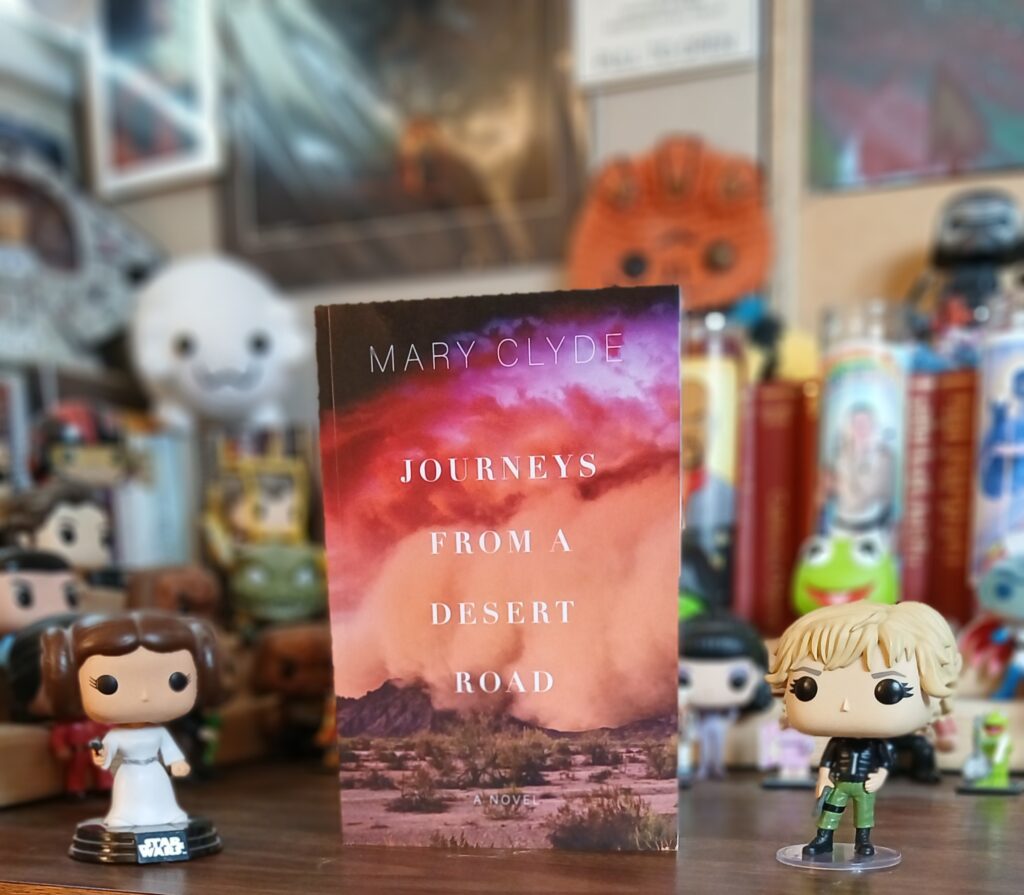Review
———
Title: Journeys From A Desert Road
Author: Mary Clyde
Publisher: Signature Books
Year Published: 2024
Pages: 209
ISBN: 9781560854784
Genre: Fiction
Price: $18.95
Reviewed by Kevin Folkman for the Association for Mormon Letters
One thing readers can be certain of when they open Journeys From a Desert Road by Mary Clyde: Something bad has happened, and Jack and his fiancée Lily are injured in Jack’s overturned car. Thus begins a pair of healing journeys, told as two separate narratives. In the first, Jack lies in a coma in a Phoenix hospital surrounded by family. In the second, Jack awakens from his injuries in an apocalyptic world poisoned by nuclear fallout.
Jack’s coma story is told primarily through the narrative of his mother Ellen, who left activity in the Church of Jesus Christ of Latter-day Saints while away at college. Ellen is supported by her business-consumed husband, Jack’s older sister Meredith, and a pioneer-heritage-active-LDS mother. In Jack’s apocalypse, he leads his family on a perilous journey from a devastated Phoenix to Ellen’s brother’s home in Payson, Arizona. In both narratives, Jack and Ellen’s family are navigating unfamiliar territory and learning to cope with new and frightening realities.
It’s tempting to select one narrative as the “true” story, but part of the appeal of Clyde’s novel is comparing the actions and emotions of the characters in both scenarios where doubt and fear confront them at every turn. Certainty becomes an early casualty. Hope and healing always seem to be receding into the future.
Ellen begs for Jack’s recovery and return to health, a goal complicated by feelings of ambivalence towards her LDS upbringing. At one point, she resents her own mother’s continued faith in God:
Suddenly, her mother’s religious beliefs irritated Ellen. They seemed to shield Iris from the full brunt of Jack’s tragedy. Mormonism reduced life on earth to a moment in time, something fleeting compared to the eternities. But how could God in heaven matter as much as Jack on earth? What did all the religion in all the world matter compared to this moment in time when Ellen’s son was fighting to survive and return to his life? (p128)
In Jack’s apocalypse story, he is not a member of the LDS church but relies heavily on the pioneer stories and heritage of his family for inspiration. His family pulls office carts like handcarts, rescued from his father’s business. Family members suffer from radiation sickness, food and supplies are limited, and it’s an uphill journey of weeks to reach a hoped-for safe haven in the mountains. Jack becomes the family’s post-apocalyptic leader even as Ellen leads in the fight to keep hope alive in Jack’s coma story. Can Jack and Ellen keep their family intact through a series of life-and-death decisions? At one point, Ellen realizes that despite her efforts at maintaining a strong front, it is just a façade. “She’d despised weak women. Now she decided that she’d become one. She wanted to beg forgiveness from all the women she’d silently judged who wept in public. As never before, she understood that no one lived the life she had imagined” (p181). Jack also faces harsh realities. In a nightmare, he remembers his grandmother singing “Come Come, Ye Saints…She sang ‘And should we die before our journey’s through, Happy day! All is well.’ How would it all be well?” (p186) His family’s stories of hope also contain the seeds of a possible bitter end for his family.
Clyde’s prose reads easily, and the narrative flows smoothly. Grim realities in the parallel stories are handled tastefully and the narrative avoids overemphasizing the worst aspects of violence and fear. In the end, miracles are small, faith results in modest hopes, doubts remain, and Ellen and Jack discover that they are both in need of healing. Journeys From a Desert Road balances these opposites carefully, giving readers a chance to reflect on their own journeys through a world of contradictions, uncertainty, and doubt, and come to their own conclusions of what it means to be healed.

